Displaying items by tag: montenegro
15 November 2018 - Representatives of the European Commission recently met with the Minister of Sustainable Development and Tourism of Montenegro, Pavle Radulović. They expressed their satisfaction with the results achieved in the field of environment and said they were eager to support Montenegro in the forthcoming period in the implementation of adopted regulations and realization of demanding infrastructure projects.
Representatives of the Directorate for Neighborhood and Enlargement Negotiations and Directorate for the Environment, as well as representatives of the European Union delegation to Montenegro, accompanied by representatives of the European Commission paid special attention to waste management and water quality. In that context, they said that provision of financial funds was a challenge along with the improvement of administration capacities in this domain.
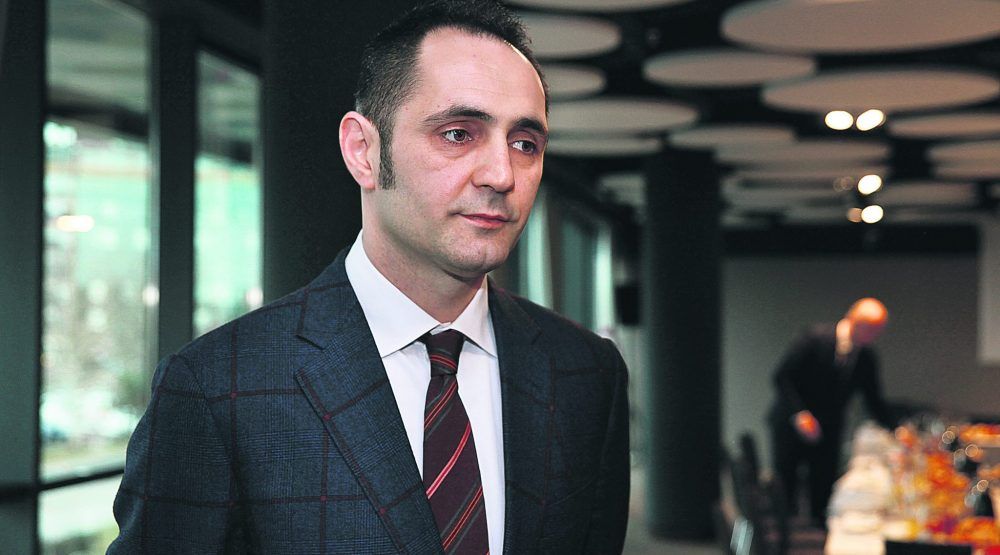
Radulović presented the current situation in regarding the environment in Montenegro, current projects, particularly “Industrial waste management and purification”. Four locations with industrial waste will be rehabilitated within this project. The objective of these projects is the improvement of the environment, the life quality of the citizens and the fulfillment of the requirements envisaged by Chapter 27.
Also, the Montenegrin Economy recently received the principles to follow, which say that everybody will have to enforce the Best Available Techniques (BAT) and work more in order to prevent and reduce pollution, by the effective recovery of energy, reduction of waste and implementing measures for preventing car accidents and their consequences. The law on industrial emissions will determine certain obligations for industrial facilities, in order to avoid or reduce pollution by emissions and waste production as well.
This means that energy producers, metal and mineral production and processing, as well as waste management and other areas such as production of cellulose and paper, slaughterhouses and intensive livestock and pig farming will have to follow strict European rules defined by the law on industrial emissions that the government is to adopt by the end of the year. Read more about Montenegrin Economy Following the European Union's standards here.
The recent progression within Chapter 27, which is covered by environmental issues of the country, started the question of Montenegrin willingness to contribute to the Global Environment. During the meeting with the representatives of the United Nation, it has been concluded that Montenegro is striving to protect its available resources but also wants to contribute to overall global environmental protection initiatives. Read more about the whole process here.
Read more about the relationship between Montenegro and European Commission here.
15 November 2018 - At its recent session, the Montenegrin Cabinet made a decision that around 120 kilometers of roads throughout Montenegro will undergo reconstruction during the next two years.
The agreement between Montenegro and the European Investment Bank (EIB) on the financing of the project "Roads reconstruction programme" includes the reconstruction of the following roads: M-8 Pljevlja - Mihajlovica (10 km); M-2.1, Bar Bridge - Dobrakovo - Bijelo Polje (14.6 km); M-2 Berane - Tunnel Lokve - Rožaje (30.9 km); M-2 Lepenac - Ribarevine - Poda - Berane (39,8 km) and M-2 Kamenovo - Petrovac - Bar (23,3 km).
Director of the Transport Directorate Savo Parača told the press following the Cabinet session that the 2015 roads programme includes 24 sections and the reconstruction of 216.3 km of main roads, while the works on the sections financed from the budget are mainly completed and that the total length of the main roads that will be reconstructed with funds from this loan is 125 km.
"By 2020, Montenegro will have 216 km of modern roads," he concluded.
Similarly, in the last five years, a total of 197,84 million EUR was invested in maintenance, reconstruction and construction of regional and trunk roads in Montenegro, as noted by the representatives of the Ministry of Transport of Montenegro recently. They also added that this had an impact on more comfortable, economical, safer and high-quality transport and, therefore, resulted in better accessibility of Montenegro as a tourism destination.
Read more about the investments in the past five years here.
15 November 2018 - The first Consular Forum organized by the Ministry of Foreign Affairs of Montenegro is being held on November 15 and 16 in Podgorica.
The Minister of Foreign Affairs of Montenegro Srđan Darmanović, who opened the Forum, expressed his satisfaction that Montenegro is the host of the first Forum that brought together representatives of seventeen countries, with the aim of exchanging experiences and views on the current situation in the area of visa policy, the challenges of migratory movements and consular services in the era of globalization, and pointed to the importance of a continuous strengthening cooperation in these areas.
"Thanks to the joint efforts over the past few years, we have made significant progress towards better cohesion in a number of areas, especially in culture, justice, internal affairs, education and science. With this same goal, we have organized the Forum, convinced that the result of this two-day work will contribute to the even better relations of the participating countries," said Darmanović.
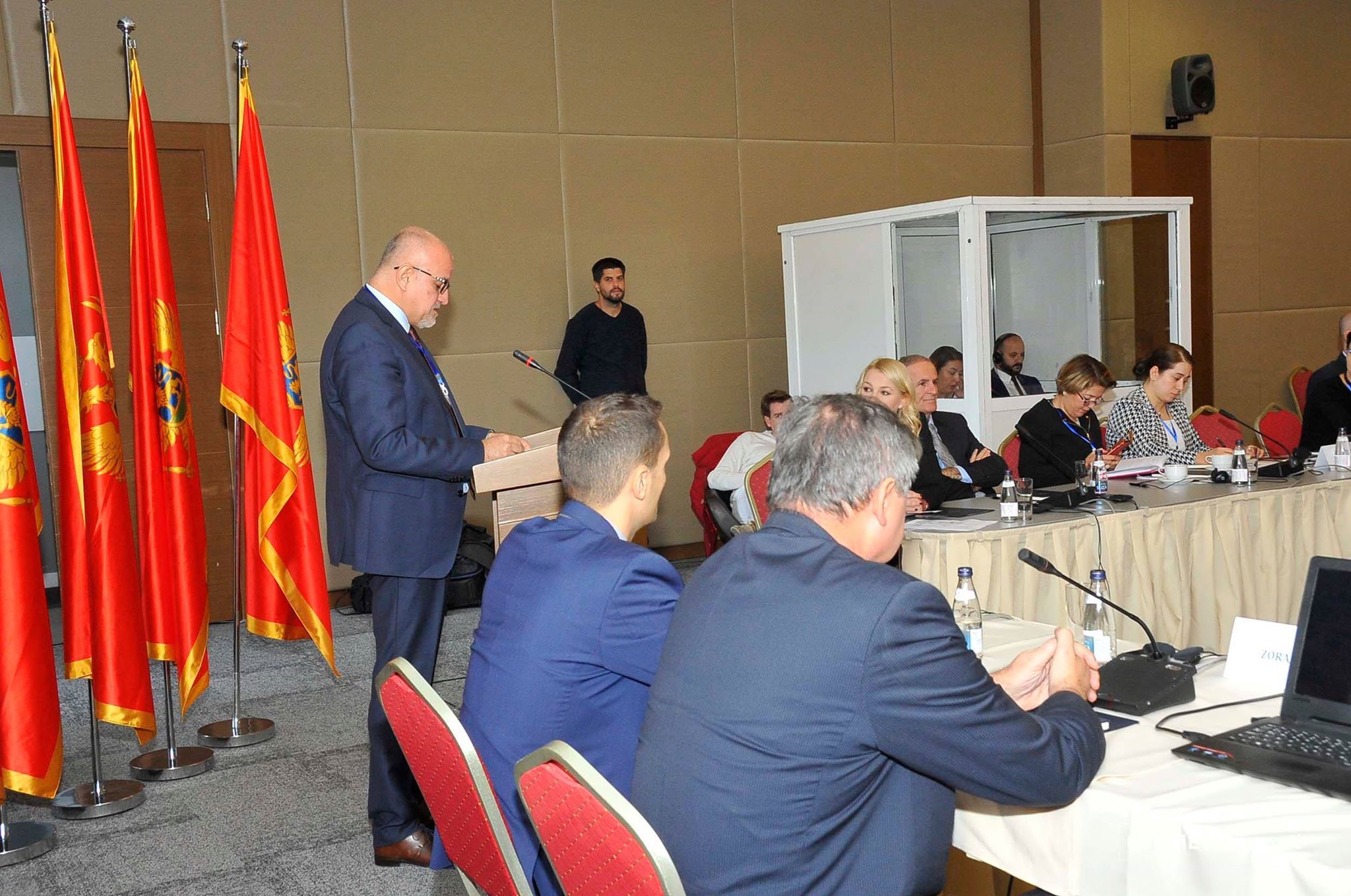
Referring to the achievements of Montenegro in terms of foreign policy priorities, he stressed that our European and Euro-Atlantic partnerships guarantee the security of the country and the security of business and investment environment and that consular activities have an important role to play in that. The Minister concluded that Montenegro successfully fulfills all the obligations arising from the visa liberalization, and thanks to such a policy of the Government, Montenegrin citizens can travel today without visas in 100 countries of the world, while citizens from 104 countries can, without visas, stay in Montenegro.
In the context of the Global Pact on Migration and the upcoming meeting in Marrakech and in connection with one of the topics of the Forum, Minister Darmanović also pointed to the need for cooperation and joint action in relations to the more and more frequent migration movements. In this regard, he stressed that Montenegro seeks to maintain regular communication with the countries of the region and other partners, continuously developing mechanisms and strengthening the capacities in order to provide an adequate response to all challenges, with full respect for international standards.
The first Consular Forum in Montenegro lasts for two days, and the list of representatives includes the ministries of foreign affairs of Albania, Austria, Bosnia and Herzegovina, Bulgaria, Croatia, the Czech Republic, Hungary, Italy, Kosovo, Macedonia, Poland, Romania, Slovenia, Slovakia and Turkey.
14 November 2018 - Washington Life Magazine, a premier lifestyle magazine and media outlet in the Washington D.C. metropolitan area, has recently posted an article about the “Dalmatian Dream” - a luxurious travel through Croatia and Montenegro. “It’s not hard to see why two small neighboring states on the eastern coast of the Adriatic Sea have become Europe’s hottest summer destinations. With over 1,200 islands, sky blue water, ancient walled cities, a rich cultural history that includes numerous UNESCO World Heritage sites, high quality local food, snow-capped peaks and pristine lakes, Croatia and Montenegro offer unsurpassed holiday experiences at generally reasonable prices," the writer Kevin Chaffee explains. He suggested to his readers to experience luxurious holidays in Montenegro, exploring the country’s nature and cultural heritage.
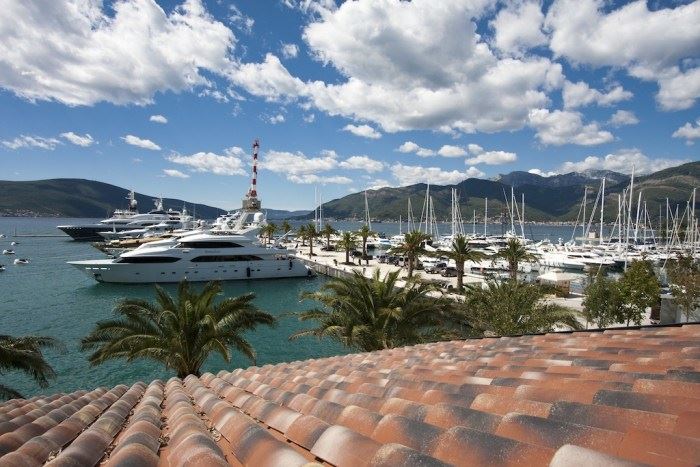
“Ferry transportation down the Dalmatian coast stops at Dubrovnik, which means renting a car (or hiring a car and driver) from Dubrovnik is the best option to explore the charms of neighboring Montenegro, now one of Europe’s hottest destinations. The journey can take two or more hours, much of it spent waiting in line to pass through both countries’ immigration controls, so be sure to allow plenty of time if you have a flight to catch on either side of the border at Dubrovnik or the Montenegrin international airports at Tivat or Podgorika. Well-heeled travelers also have the option of private helicopter service.
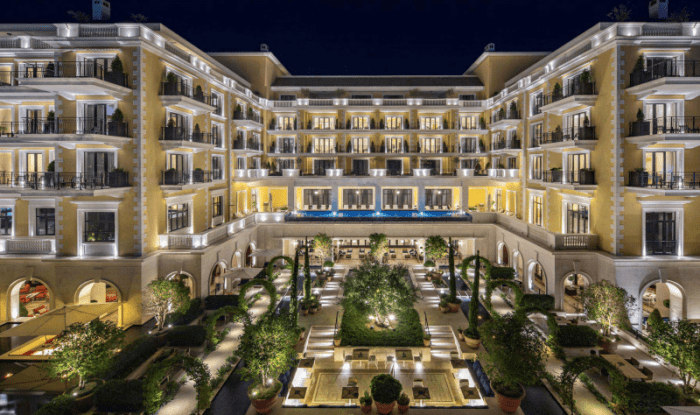
Porto Montenegro in the town of Tivat on the shore of the nearby UNESCO-protected Boka Bay, is a city unto itself offering every amenity international jet-setters could desire. Developed over the past dozen years and now owned by the Investment Corporation of Dubai, it has become “the new Monaco” with the world’s largest super yachts filling up every spot (up to 800 feet) in the 450-berth harbor in peak summer season. The adjacent “nautical village” teems with high-end bars and boutiques catering to the tastes of an international clientele for whom luxury is an absolute necessity.
The high-end Regent Porto Montenegro, loosely designed to reflect a refined Venetian Renaissance theme, offers highly personalized service and luxurious accommodations in its 87 expansive rooms and 62 suites and apartments, most with balconies overlooking the water. The stunning 10,000-square-foot pool complex encompasses a luxurious spa and hammam, three swimming pools and a gym. Guests also have access via private shuttle to a separate pool/nightclub facility with a Saint-Tropez vibe as well as a secluded private beach. A meal at the Mediterranean-inspired Murano Restaurant and a drink at the cozy Library Bar are recommended as well as a visit to the outstanding Gourmet Corner, which specializes in artisanal cakes and pastries. From $325. regenthotels.com.
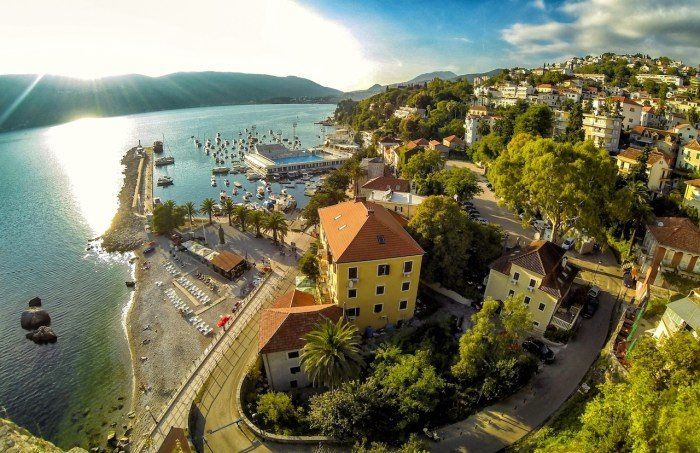
After ogling the yachts, check out the marina’s pricey shops (don’t miss the amazing pharmacy) and watch teenage fashion victims parade about in $700 Dolce & Gabbana T-shirts and other designer duds as they amble to and from daddy’s boat. If you are in a more serious-minded mood, the nearby Naval Heritage Center maritime museum and submarine are worth a look.
You’ll also want to devote a day or more to explore the towns on Boka Bay, Europe’s southernmost fjord. The best way to accomplish this is via private motorboat with a captain/guide who can be hired through the Regent’s concierge (embarkation is immediately adjacent to the hotel). Along the way, Herceg Novi displays a fine combination of romantic, Byzantine and oriental architectural styles while Risan is known for the remnants of classical culture found there, dominated by the remains of a Roman patrician’s villa with beautiful mosaic floors. Kotor, a UNESCO-protected site, is the top attraction, an old Venetian city and cultural center that has withstood numerous invasions over the last thousand or so years and now attracts a lively crowd in summer that throngs its picturesque churches, museums and restaurants. It’s easy to experience daily life while meandering about the narrow lanes and small squares because it has not been totally overwhelmed by tourists except when cruise ship passengers disembark for a few hours of look & see. Finally there is Perast, another UNESCO Heritage-protected town where no cars are allowed, making it rather pleasant to explore its palaces and churches, some in ruins, set amid small hotels and family homes.
Your captain will surely disembark you at Our Lady of the Rocks (Croatian: Gospa od Škrpjela) off the coast of Perast, an artificial islet created by a sinking derelict and pirated ships loaded with rocks. The Roman Catholic Church of the same name was constructed by local seamen who kept an ancient oath after finding an icon of the Madonna and Child on the rock in the sea in 1452. The church, which was renovated in 1722, contains 68 works by Tripo Kokolja, a famous 17th-century Baroque painter from Perast.
At the foot of Porto Montenegro’s yacht-infested Jetty 1, One Restaurant’s spacious terrace beckons with “the most expensive view in the country.” Although the modern Adriatic menu featuring local ingredients competes with international favorites unavailable elsewhere, people watching will always be the main course here. The extensive wine list features many rosé labels as well as high-end champagnes. The Clubhouse, located a bit aft in the harbor, is a low-key nightspot that attracts an eclectic, younger crowd. Owned by a pair of Australian “best mates,” this casual watering hole is famed for oddly named drinks (“Boulevardier,” “Pink Pussy”), DJs and live music as well as great eavesdropping opportunities when off-duly crew from the super yachts dish about the owners’ various peculiarities and peccadilloes. It’s also the best place in town to watch major televised sports events like the World Cup.
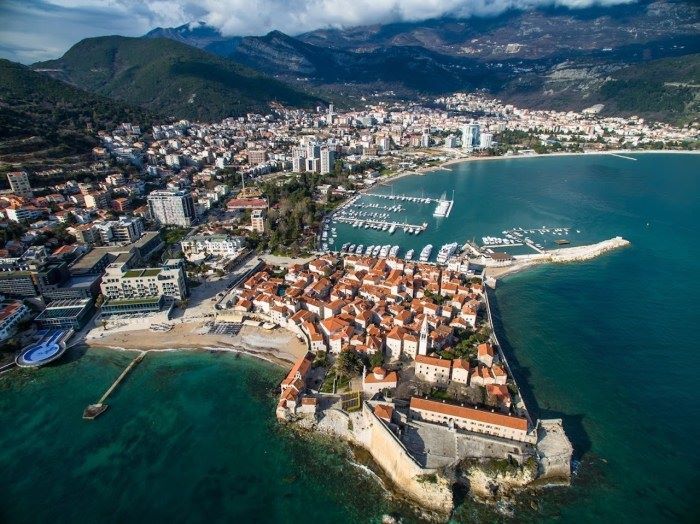
It is best to rent a car to further explore Montenegro. Begin by driving from Tivat further down the coast to Budva, a summer party paradise boasting the best beaches in the country, ranging from the secluded and quiet to those with bustling party scenes and thunderous dance music that lasts until sunset (when scenesters continue their revelries back in the historic old town). Founded by the Greeks in the fourth century B.C. and fortified in the Middle Ages, it is now the center of the “Budva Riviera,” which runs 22 miles from Trsteno to Buljarica, and is dotted with sheltered coves and miles of sand and pebble beaches. Those with deep pockets but no super yacht can be spotted at Montenegro’s most expensive and exclusive hotel, the Aman Sveti Stefan, a complex of 15th-century stone buildings more like a medieval village than a hotel, housing 50 palatial suites and cottages with inspiring views of the coast. From $750. aman.com.
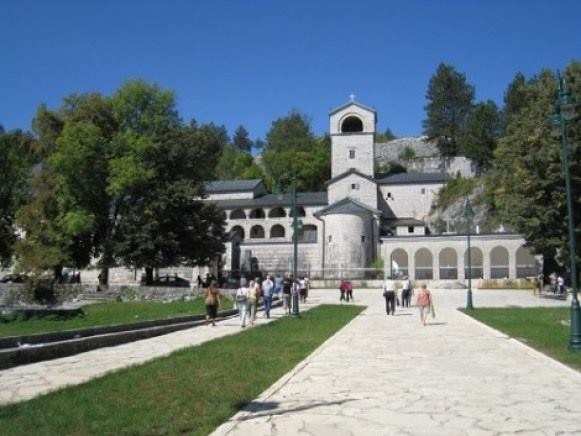
Head north to Cetinje, an odd combination of former capital city and quaint village that is the nation’s cultural heart. Get a 10-euro ticket to gain entry to six different museums, the most interesting and important of which is the King Nikola Museum Palace. The home of the ruling Petrovi-Njegoš dynasty until they fled in 1918, its somewhat musty rooms contain ornate furniture, Chinese vases, imposing portraits, taxidermied animals and a beautiful library that is closed to the public but can sometimes be accessed via a hired guide. Also visit Cetinje Monastery dating to 1786 and the History Museum, grandly housed in the city’s former parliament, that follows a timeline from prehistoric times to the mid-1950s.
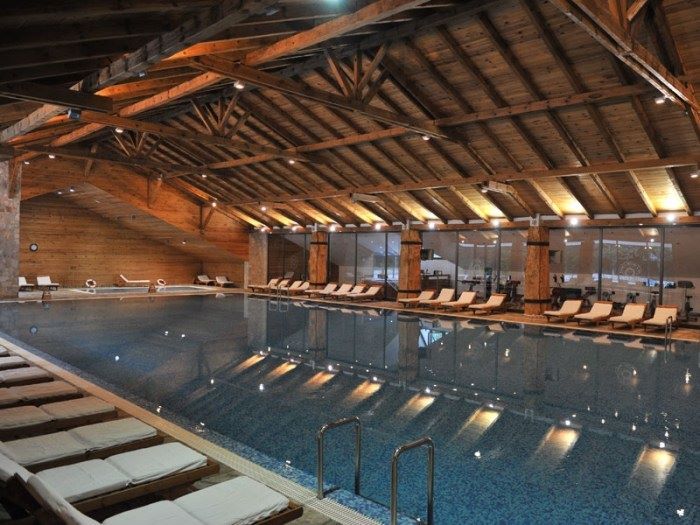
Meander further northward enjoying the dramatic views through the mountainous region where the country’s vast national parks and pristine lakes are located. Check in at the Bianca Resort & Spa, a ski lodge in the town of Kolasin that is quiet, clean and features a huge pool, a whirlpool and an excellent sauna. Rooms are smallish and have no air conditioning or screens on the windows (although that is generally not a problem at this altitude). The cafeteria-style food is bland at best with the staff grumbling if they have to prepare anything off the limited à la carte menu — “communist-era hospitality” at its best! From $75, kolasin1450,com. (TIP: Ask for directions to a nearby restaurant run by the Damjanovica family that features hearty local specialties including local trout and kacamak, a tasty cheese and potato staple.)
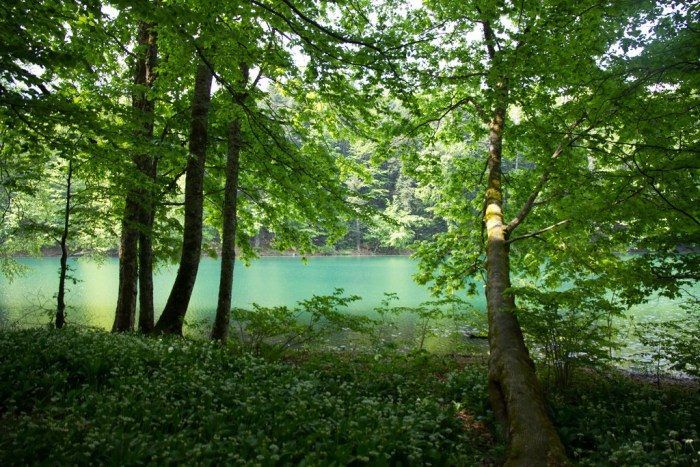
From Kolasin it’s a two-hour drive to Biogradska Gora, the second oldest (1878) national park in the world, boasting one of the largest primeval forests in Europe. You’ll want to spend most of the day exploring its verdant landscapes, six pristine glacial lakes and 26 different habitats burgeoning with diverse flora, fauna and fish (including the grayling, which has disappeared from the rest of Europe). Historic heritage sites include sacral monuments and traditional architecture structures. Contact the The Explorer Tourist Agency explorer.co.me for top notch guided tours and be sure to ask about a visit to Eku Katun Vranjak, about 5,000 feet above sea level at the end of a bumpy, winding dirt road. The remote, family-run nomadic settlement of ten wooden chalets (some are available for overnight stays) sits amid breathtaking peaks and rolling pastures with herds of goats and cows feeding on grass as you enjoy a hearty lunch there. Reserve overnight stays and lunch-only visits at jelka.me.
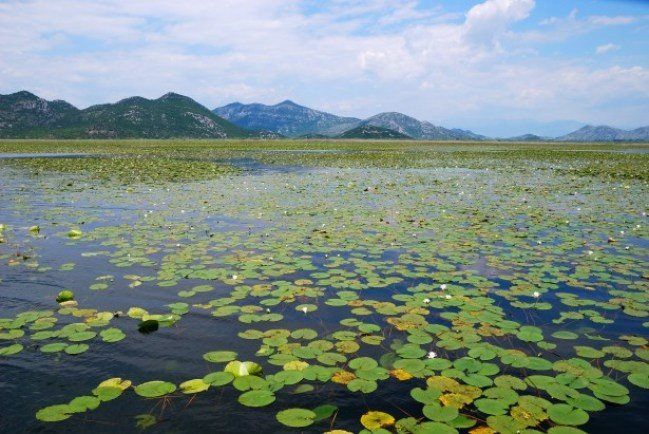
Enjoy the drive south back to Tivat past rolling farmlands, creeks and the impressive Moraca Canyon to Podgorica (pronounced Pod-go-reet-sa), Montenegro’s “pocket-sized” capital known as “Titograd” in communist times. Stroll along the main street, the Slobode, as well as the side lanes to explore the Old Town (Stara Varos) and its shops, cafes and restaurants including Pod Volat for delicious pizzas and regional dishes that are ridiculously cheap.
Lake Skadar is not on the normal tourist route because it is neither on the coast nor anywhere near to the sprawling national parks. It is however a great place to stop if you enjoy the great outdoors and want to hike, bicycle, swim at freshwater beaches or explore nature preserves. Be sure to visit the Serbian Orthodox Vranjina Monastery, one of the country’s oldest religious sites located on the south-east part of Vranjina island and accessible by an access road from the shore.”
Read more information about the article and the luxurious travel through Montenegro and Croatia here.
12 November 2018 - Montenegro, 140 years after the Berlin Congress and a turning point in its history, is on a safe path to becoming the next full member of the European Union and taking its place among the developed countries. This was underlined at today's ceremony marking the 140th anniversary of the Berlin Congress.
The celebration of the 140th anniversary of the recognition of Montenegro's independence at the Berlin Congress was sponsored by the Office for European Integration and the Rectorate of the University of Montenegro.
Chief Negotiator Aleksandar Drljević reminded of the most important attainment of the Berlin Congress - an international recognition of the statehood of Montenegro, which was won after a long-standing struggle in this region, pointing out that this event represented a new page of Montenegro's history, which laid the foundations for the creation of a modern European state.
"Today, 140 years later, Montenegro, by joining NATO, stands side by side with the European and world powers. It is also a safe and decisive way towards becoming the next full member of the European Union," Drljević concluded.
Rector of the University of Montenegro Danilo Nikolić pointed out that the University of Montenegro is proudly carrying the name of the country and, with its decades-long tradition of teaching, scientific research and innovative activities, is one of the strategic bases for its development.
"Human capital represents the most important development resource of advanced economies, and its quality is conditioned by the quality of the education system and the development of the knowledge society. Through the development of human and intellectual capital, the University of Montenegro flexibly emphasizes its key role and responsibility: to create renowned academic citizens, socially responsible individuals and productive generations, which will ensure the democratic development and economic prosperity of Montenegrin society and the state," Nikolić noted.
12 November 2018 - On the occasion of the Jubilee 70 years since the founding of the Athletic Federation of Montenegro and 135 years of athletics in Montenegro, the Municipality of Pljevlja has won a Golden Plaque for the development of athletic sport in both Pljevlja and Montenegro. The Golden Plaque, as the highest recognition of the Athletic Federation of Montenegro, is awarded to individuals or organizations for many years of work and special results in the improvement of athletic sport as well as an exceptional contribution to increasing the reputation of Montenegro and Montenegrin athletics in the country and abroad.
The award ceremony will be held on November 17, 2018 (Saturday) at 12:00 PM in the Millennium hall at the Ramada Hotel in Podgorica.
The ceremony will be attended by President of the European Athletic Federation Svein Arne Hansen, Vice President of the European Athletic Federation and President of the Balkan Athletic Federation Dobromir Karamarinov, Presidents of Athletic Federations of countries from the region: Serbia, Croatia, Bosnia and Herzegovina, Macedonia, Albania and Kosovo, Minister of Sport of Montenegro Nikola Janović, President of the Montenegrin Olympic Committee, Dušan Simonović, as well as numerous prominent athletic officials.
In addition to the municipality of Pljevlja, the Golden Plaque will be given to the Athletic Club "Rudar" and its coaches Budimir Jestrović and Slaviša Vraneš.
11 November 2018 - Negotiator for Chapters 23 and 24, Marijana Laković, said she has expected the European Commission would recognize the stable progress the Montenegrin institutions have achieved on the road to the European Union. Laković emphasized the rule of law has been an area requiring continuous results, there are some challenges but Montenegrin institutions have been decisive in an attempt to use all the available resources to achieve the best results possible.
“The European Commission regularly submits the interim reports on their perception when it comes to the progress in the area of the rule of law, i.e. chapters 23 and 24. We expect that the European Commission would recognize stable progress in numerous significant aspects of the rule of law, evaluating concrete results achieved by our institutions,” emphasized Laković.
When asked whether Montenegro reached the results the European Commission requested, she said Montenegro has been completely committed to the new approach in negotiations, much more demanding compared with the previous enlargements.
“The fact clearly denoting our progress in the area of rule of law is that so far Montenegro has started talks in 31 chapters, negotiations in 3 negotiation chapters have been temporarily closed, while we expect to open the 2 remaining chapters soon. Also, we expect the European Commission to recognize the latest activities of the National Police and state prosecutor’s office in fighting organized crime, high-level corruption, money laundering, temporarily seized assets and confiscated drugs,” concluded Laković.
Laković also added that by implementing thorough reform activities in the judiciary and setting up of a modern legislative framework, Montenegro has proved its full democratic capacity to enforce the most contemporary European standards in this area.
Source: Cafe del Montenegro/Pobjeda
07 November 2018 - Montenegro's accession to the European Union and the implementation of comprehensive reforms on this path are in the interest of the Montenegrin citizens and the economy, Chief Negotiator for Montenegrin Accession to the European Union Aleksandar Drljević and Ambassador of Sweden to Montenegro Jan Lundin concluded at the meeting held on November 7.
The two officials stated that in the current accession process, Montenegro has already reached the standards of European Union member states in some areas and that there are reasons for satisfaction with the achieved results.
The Chief Negotiator Drljević pointed out that the Government is committed to implementing comprehensive reforms, not because of membership in the European Union, but primarily because of improving the living standards of its citizens. In addition, he added that membership in NATO and the European Union contributes to security and stability and strengthens the voice of Montenegro in the world.
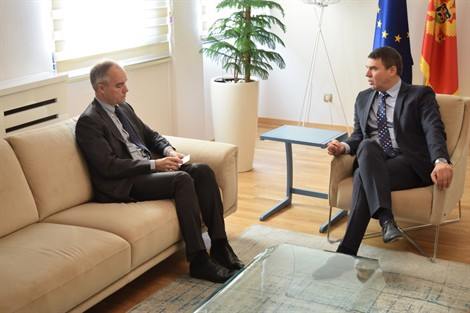
Bearing in mind the new approach to the negotiations, Chief Negotiator Drljević stated that the Government is fully committed to meeting the obligations under Chapters 23 and 24 that form the core of the negotiation process. He added that he is hopeful that the remaining two negotiating chapters will soon be opened, adding that there are several chapters in which all obligations are fulfilled and are ready for temporary closure.
Ambassador Lundin congratulated him on the achieved results by pointing out that Montenegro is the most advanced Western Balkan country in the European Union accession process, and that it enjoys the full support of Sweden for membership of the Union.
He said that the process of negotiations is now much more demanding than it was in the previous enlargements of the Union and that great efforts and demanding reforms are needed, especially in the areas of the rule of law and environmental protection.
07 November 2018 - Successful implementation of joint activities of Ministry of Internal Affairs of Montenegro and the Geneva Centre for the Democratic Control of Armed Forces (DCAF) is a good basis for continuing cooperation in the direction of further strengthening regional and international cooperation in the field of border security, it was concluded at today's meeting of Montenegrin Minister Mevludin Nuhodžić with Director of DCAF Ljubljana and DCAF Border Security Programme for Southeast Europe Anton Travner.
Minister Nuhodžić expressed his gratitude for the continued assistance provided by DCAF to Montenegro, especially in the area of cross-border police cooperation, exchanging experiences and the implementation of training, and highlighted his satisfaction with previous joint actions under the DCAF Border Security Programme.
The meeting was an opportunity to share impressions on the recently implemented joint police operation "Tuzi 2018", which was conducted with the support of representatives of European agencies Europol, Frontex and IOM, which confirmed that Montenegro is working proactively in the prevention of illegal migration and cross-border crime. Both sides agreed that the operation was extremely successful, both in terms of detecting migratory routes and exchanging information between the police and the implementation of the readmission procedure with the Republic of Albania.
While expressing full support for Montenegro in the area of border security, Director DCAF Ljubljana Anton Travner praised Montenegro's progress so far and expressed the expectation that good dynamics will continue, with a special focus on further improving technical capacities at the border, strengthening human resources and strengthening the mutual cooperation of police officers in the field of combating cross-border crime and illegal migration.
The meeting also discussed activities planned for the next period within the DCAF Border Security Programme, and the readiness of Montenegro to continue its participation in operations and projects in order to achieve modern standards in this area.
Read more information about Montenegro’s border security here, while the EU assistance to Montenegro’s border security is presented here.
06 November 2018 - The prime ministers of Montenegro and Finland, Duško Marković and Juha Sipilä, agreed at the working meeting, which took place in Helsinki, that Montenegro has made strong progress in the European integration process and that the process will be continued with the full support of Finland, which will take over the presidency of the Council of the European Union in the second half of 2019.
Prime Minister Marković welcomed the merit-based approach depending on concrete results achieved by each individual country, adding that, in addition to Finland’s support, Montenegro also expects the support of other Nordic countries.
The Prime Minister of Finland said that Montenegro has made significant progress over the past ten years, highlighting that it has done the best job in the region, which, in his words, is clearly visible. Prime Minister Sipila expressed his Government's position that Montenegro is welcomed into the European Union once it has fulfilled the necessary standards.
Prime Minister Marković informed his Finnish counterpart about the comprehensive economic reforms the Government of Montenegro has undertaken with a view to achieving fiscal consolidation, as well as the numerous development projects that are being implemented with the aim of raising the living standards of citizens and a higher quality of life.
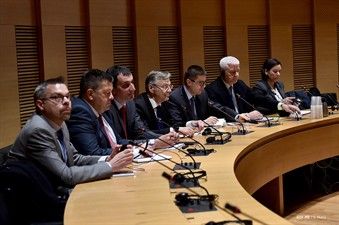
The Prime Minister of Finland noted that Montenegro is now a very attractive investment destination, while Prime Minister Marković stressed that the country has seen obvious democratic and development transformation, in particular after joining NATO and achieving significant progress in the context of EU membership.
The Prime Minister expressed his gratitude to Finland for supporting the EU integration of the Western Balkans, thus contributing to the stability of Europe. "The European perspective should be open to the entire region. This strengthens democracy throughout the region," PM Marković said.
Speaking about the process of Montenegrin European integration, the Prime Minister said that Montenegro made a major step forward in the rule of law and in all significant areas during the negotiations with the European Commission in the past six years.
PM Marković said that the Government of Montenegro believes that the Grand Committee, which has the power to make decisions on all issues of Finland's participation in the European Union, will contribute to Montenegro's progress in the integration process by supporting the enlargement policy.
PM Marković also expressed the belief that the Finnish EU presidency will mark a new phase in the negotiating process of Montenegro, which is precisely the opening of negotiation chapters.
"These talks aim not only to bring Montenegro closer to the EU but also to gain a higher level of trust in Montenegro and new partnerships for Montenegro on its path to the EU," Prime Minister Duško Marković concluded at the end of his working visit to the Republic of Finland.






